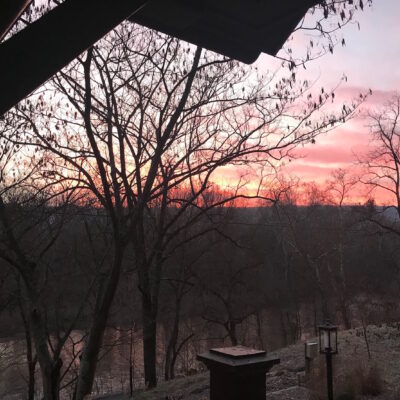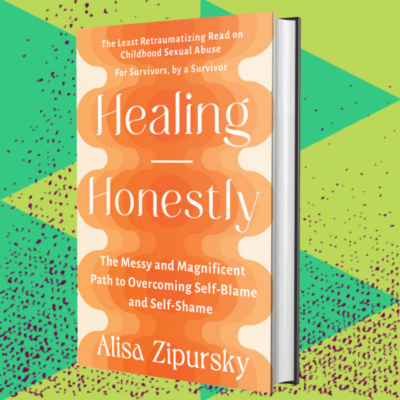This story may contain descriptions of PTSD symptoms, discussion of child sexual abuse, and the effects of trauma.
It’s that time of year, where the holidays come and everyone expects a lot of cheer and yet, for those of us living with trauma, this can be a time that is triggering as hell. Say it with me, “PTSD: what a fun and sexy time!” I originally wrote this story in 2018, but want to update it with insights I’ve had and lessons I’ve learned this past year.
Don’t touch/hug anyone you don’t want to, and share that message with the kids you’re around!
It sounds so simple. We shouldn’t touch or hug anyone we don’t want to, no matter what manners of family obligation teaches us. But it is easier said than done. Consent is about so much more than sex, as Edxie Betts discusses so powerfully. Consent has to do with everything in life, including any touch we experience, weather sexual or not. Around the holidays, there is an expectation of physical contact, and I’m here to say, you do not need to touch ANYONE you don’t want to. Your sense of safety is way more important than politeness, and it is way more important than other people’s discomfort with you asserting your physical boundaries.
I encourage each of us who interact with kids to help reinforce this consent, and resist when parents tell their kids to hug you, or if you’re a parent and you want to direct your child to hug someone. It is a powerful message to send a kid that their body is their own, and they decide who touches them. For me, it’s been really healing to practice this around kids, offering them the experience I wish I had had as a child. For more on navigating being a survivor and being around kids, I cannot recommend Pure Love Talks enough with Ignacio Rivera and their daughter Mandy. It’s lifechanging.
We do not have to acknowledge the holidays! We just need have a plan for caring for ourselves!
We do not have to celebrate holidays! They mean to us what we want them to mean to us! You don’t owe anyone a visit, you don’t owe anyone an appearance. Do what makes you feel safe, grounded and comforted. The holidays are a wonderful time to experiment with prioritzing our safety over other people’s wishes for us. My only piece of advice is, whether or not you acknowledge the holidays, do have a plan for caring for yourself, something to look forward to or something that brings comfort. It’s a nice time do that for ourselves.
Advice you all have given me about navigating the holidays with trauma in our lives
I’ve been asking all of you for a couple weeks now for your strategies for dealing with the holidays with trauma in our lives and I wanted to give a list of those strategies here!
- Build new traditions with my chosen family
- Choosing to be around people I want to and not the people I feel like I have to
- Walks with my dog
- Heavy/weighted blankets
- Do the thing that makes me happy and remember I’m not selfish for doing it
- Staying connected with others who understand whether it’s reading podcasts or friends
- Self-care, I don’t force myself to stay in the situations longer than necessary and I say ‘no’
- Going home for a shorter period of time
- Staying at a friends house or a hotel instead of my childhood home
Below you will find the original story:
The holidays are can be hard for so many of us. While we are surrounded by images of happy families coming together, it can feel particularly isolating for those of us who have a traumatic relationship with our families and feel anxious or unsafe about spending more time with them. Whether we come from a home with alcoholism, physical, sexual and emotional abuse, or violence, being with our families can be a re-traumatizing experience for us, and the holidays are a very important time for us to care for our health and safety. Below are a few thoughts to keep in mind to help care for ourselves during this difficult time.
Creating a plan for emotional support during the holidays
Identify a trusted friend, sibling or auntie that provides you with love and strength and ask them to be your person while you’re with your family during the holidays. Create a plan together, whether it’s having daily check-ins, or it’s asking your friend to be “on-call” during a difficult dinner so you can text them during bathroom breaks, and let your person know what you need.
I’ve definitely done this with my bestie Kate, where I let her know in advance that I’m going to be doing something really difficult, so even though she’s on the other side of the country, she can be there for me and proactively check in on me. It really helps me.
Establishing a plan in advance can make it much easier to reach out for support during the hard moments, and it offers us the steady reminder that we are not alone. While it may feel like we are asking a lot of our friends, know that our friends want to give us support, and it can be a relief for them to know exactly how we want them to support us.
Establishing boundaries with our families
Establishing boundaries with our families can help us to feel safer when entering traumatic or triggering spaces. Each of us gets to decide what our boundaries are, based on our specific needs of what makes us feel safe. It can be that we aren’t going to stay at home with our families, but instead at a friend’s house. Or, if we are visiting for the holidays, that our trip will be for a shorter time than it was the year before. It can be that we tell our families we need to “work” or “study” for three hours each day, but during those hours we are free to be alone and escape into our favorite TV shows. I love saying I have to work and then watching Netflix and playing games on my phone, it can be enormously restorative.
Boundaries may also require action from our families, such as telling our families certain topics are off-limits because we know how triggering they can be for our trauma.
These boundaries are specific to each of us, and they help us to feel our power and control in environments that remind of us times in our lives where we didn’t feel control. It is important for us to tell our family about our boundaries and it is our jobs to enforce our boundaries, even if our family is not abiding by them.
Identifying a physical safe space nearby
it is helpful for us to identify a physical safe space that is accessible to us during the holidays. It can be someone else’s house, the mall, a coffee shop, a park, or anywhere else that we have positive feelings towards that is easy for us to get to during the holidays. It can be more than one place and it is important to have a plan for a safe space during Christmas when many places are closed (remember, the movies will always stay open).
Identifying these places and having a plan on how to get to them reminds us that we are not trapped. We will have somewhere to go to that can help us feel safe again if we have been triggered or re-traumatized in our homes.
Remember, we are experts in our own safety
Each of us is the expert in our own safety. It is so important that we give ourselves permission to listen to our gut instinct about what we need in order to be safe. It can be hard to listen to our gut when we can have such intense feelings of guilt and obligation regarding our families. Sometimes it helps to ask ourselves, “What would it feel like if I prioritize my physical and mental safety over my family?” Deep down, each of us knows what we need in order to get through this difficult time. It is a good time to be aware of what our bodies and minds need, including rest, nourishing food, exercise or meditation to feel cared for and grounded.
If the holidays feel scary and anxiety-provoking for you, know that you are not alone. Spending more time with our families at the holidays can make our trauma, and therefore our depression, anxiety and suicidal thoughts more present and persistent. This is a key time for us to put steps in place to make ourselves feel more safe. Remember, we get to make the rules and be in charge of our own safety.
Remember, you can always call or chat trained staff at the National Sexual Assault Hotline for support at 1-800-656-4673 or use their free online chat. Both are confidential and available 24/7. If you’re having thoughts of suicide please call the National Prevention Lifeline at 1-800-273-8255.
I know this time can be so difficult and triggering. Know that if you are struggling, you are not alone, I see you, your pain is real, and it matters. I’ll be sending all of you healing vibes.

